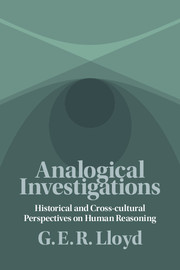Book contents
- Frontmatter
- Contents
- List of diagrams
- Introduction
- 1 On the very possibility of mutual intelligibility
- 2 The multiple valences of comparatism
- 3 Analogies, images and models in ethics: some first-order and second-order observations on their use and evaluation in ancient Greece and China
- 4 Analogies as heuristic
- 5 Ontologies revisited
- 6 Conclusions
- Glossary of Chinese terms
- Notes on editions
- Bibliography
- Index
6 - Conclusions
Published online by Cambridge University Press: 05 September 2015
- Frontmatter
- Contents
- List of diagrams
- Introduction
- 1 On the very possibility of mutual intelligibility
- 2 The multiple valences of comparatism
- 3 Analogies, images and models in ethics: some first-order and second-order observations on their use and evaluation in ancient Greece and China
- 4 Analogies as heuristic
- 5 Ontologies revisited
- 6 Conclusions
- Glossary of Chinese terms
- Notes on editions
- Bibliography
- Index
Summary
I began my Introduction by identifying some of the characteristic ambitions of the philosophy and science that have been developed largely in the West and by posing some of the problems that have increasingly been raised, in recent years, about aspects of those ambitions. Where do the ideals adopted by Western philosophy and science represent the key to greater understanding and to greater human welfare, thereby justifying the grandiose claims sometimes made for them? Where, on the contrary, are they open to criticism, distracting or downright misguided? How, in any event, are we to come to terms with the fact – when it is a fact – that these were historical developments associated particularly with the West and in many cases part of the heritage from ancient Greece? It is time now to take stock and to get the points both of the triumphalists and of their critics into perspective.
First a recapitulation of my main arguments is in order before I rehearse some of the objections that a more traditional view would mount. We asked, in Chapter 1, What are the conditions of possibility for translation and understanding? Obviously they cannot be perfect, but they are certainly not completely beyond our reach. Of course we have to start with our existing concepts, but I have insisted on their revisability. The difficulties we encounter are not insuperable barriers to communication, but rather incentives to learn. Assessment is inevitable, but that does not mean that we have a monopoly of the criteria by which everyone else is to be judged, for comparisons, as I argued in Chapter 2, should be even-handed. Often, as I showed with Greek and Chinese examples in Chapter 3, what are being compared are rival analogies, images and models, but it is a mistake to insist on replacing these everywhere with direct statements that conform to the standard requirements of univocity set down by Platonic and Aristotelian definition. Analogies may indeed mislead, but as Chapter 4 illustrated, they are a crucial resource for expanding our understanding. Faced with a plethora of rival accounts, ancient and modern, of ontologies or what there is, we should not assume that a single definitive solution should be our goal. Reality, I have argued throughout, is multidimensional and the terms we use to capture its different facets exhibit semantic stretch. I have brought to bear those two notions, of multidimensionality and semantic stretch, in suggesting that revisions are needed not just in our understanding of ‘colour’ and ‘space’, for example, but also of ‘nature’, ‘animal’, ‘human’, ‘person’, ‘agency’ and ‘causation’.
Yet against all of that, many would claim that science and philosophy have only progressed in the ways they have because univocity and rigour have been demanded. We must have clear and precise definitions, many assume, otherwise we are lost. Ideally these should take the form of identifying the genus and giving the differentia. Again we must have strict demonstration, for mere persuasiveness or plausibility is not enough. Demonstrations should combine true premises (Aristotle thought the ultimately primary ones should include definitions and axioms) with valid deductive argument for which we need, of course, a clear concept of validity. Measurement, the replicability of experimentation, statistical analysis and computer modelling (to mention some of the styles that Hacking, e.g. 1992, 2009, 2012, has discussed) all have their fundamental contribution to make if we want our results to be robust.
- Type
- Chapter
- Information
- Analogical InvestigationsHistorical and Cross-Cultural Perspectives on Human Reasoning, pp. 109 - 121Publisher: Cambridge University PressPrint publication year: 2015



